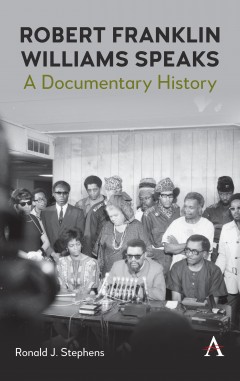Robert Franklin Williams Speaks: A Documentary History
Edited by Ronald J. Stephens
Other Formats Available:
E-Book- About This Book
- Reviews
- Author Information
- Series
- Table of Contents
- Links
- Podcasts
About This Book
Williams fought a good fight for a better democracy and the collective equal rights of African Americans. He was not just a revolutionary voice and internationalist leader and voice in the Black Power movement, and should not be forgotten or dismissed because he maintained other reasons for raging his grievance towards the policies and practices of democracy in the United States. Robert F. Williams neither should be reduced to the status of a tool of Cold War politics or to a study about armed self-defense. Rather, in his contesting the government’s refusal to defend the human rights of 22 million African Americans, Williams’ actions and uncompromising stance directly and affirmatively addressed the promise and rights guaranteed US citizenship and the constitutional rights of the members of that society. Williams critically questioned numerous unjust acts and human rights violations, and waged (often a one-family man) war against America’s inability to practice principles of freedom and democracy, when these mistreatments were ignored. Robert F. Williams was an independent thinker, a compassionate and intelligent man. He was a common man, and despite his lofty intelligence, he was an American, claiming his right to his American citizenship. He was acutely aware of the broken promises of the United States. Yet, he nonetheless remained fully invested in assuming all of the rights, privileges, and responsibilities the Constitution guaranteed American citizens of African descent. He was always focused on making sure Americans took full advantage of the tools available in society and/or in government to bring them to bear in their situation. He believed in the redress of government, and the citizen’s right to do that. He believed that the US Constitution should be abided by, and that that was the right of every citizen. Robert F. Williams collaborated with leaders of two foreign countries in order to communicate his grievances against the United States government and its citizens who remained complicit in practices of racial injustice. His exile in China from 1966 to 1969 led to his being expunged from the memory of Monroe, North Carolina’s trumped up charges of kidnapping. In the South and the Black Diaspora of the Midwest, he was a local civil rights leader, pragmatist, and internationalist in twentieth-century world history.
Reviews
“Ronald J. Stephens, one of the major scholars of African American life, leisure, and culture, has written a powerful portrayal of a hero of the American ideal. In Robert Franklin Williams Speaks: A Documentary History, we find Stephens’s brilliant analytical mind bringing us an organic and profound narrative of an African American living in resistance and victory.” — Molefi Kete Asante, Professor, Department of Africology at Temple University in Philadelphia
This book promises to be a significant addition to the scholarship on one of America’s foremost freedom fighters of the 20th century. Robert F. Williams is deserving of such scholarly attention. -- Judson L. Jeffries, The Ohio State University
Ronald J. Stephens’s provocative, impressive, exhaustively researched, and thoughtful study chronicles Robert Williams’s life history, protests as a local civil rights leader, and international activist triumphs on the world stage. Williams life’s work demonstrates how to use the lessons of the past to confront continuing issues of today. A must read for scholars and activists alike. -- Jakobi Williams, Indiana University
Author Information
Ronald J. Stephens is a professor of African American studies in the School of Interdisciplinary Studies and College of Liberal Arts at Purdue University.
Series
Table of Contents
Acknowledgments; Part I: Robert Franklin and Mabel Robinson Williams: Modeled Black Activist Couple Resistance to Racial Injustice in the United States; Part II: Monroe, North Carolina, 1955–1961; Havana, Cuba, 1961–1966; Peking, China, 1966–1969; Appendices; Selected Bibliography; Acknowledgments; Index.
Links
Stay Updated
Information
Latest Tweets



